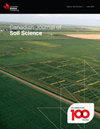Gamma radiation for the estimation of mineral soil water content in a boreal forest
IF 1.5
4区 农林科学
Q4 SOIL SCIENCE
引用次数: 0
Abstract
Continuous monitoring of water quantities in different soil horizons is necessary to understand the behavior of infiltrated water in the soil. Under certain conditions, using measurements of natural ground gamma radiation can help us estimate soil water content measurements over a 100 m2 surface within a 15 cm depth. A CS725 sensor can provide up to four daily estimates of soil water content by detecting the natural emission of gamma radiation. However, in boreal forest environments, gamma radiation mitigated by the water in the thick humus layers (LFH horizon) can bias in the underlying mineral soil water content measurements. The objective of this research was to evaluate the accuracy of methods that incorporate variables describing the surface humus layer into calculations of the underlying mineral soil water content, by measuring the soil's natural gamma emission with the CS725. Using raw gamma radiation values obtained by CS725 sensors deployed over various boreal soils, we tested two functions. The first one included variables describing the humus layer and the other excluded these variables (manufacturer’s method). The function that included the descriptive humus layer variables showed superior results compared to the function without. The results of this study suggest that the CS725 sensor can adequately estimate mineral soil water content within ± 10% absolute of the reference water content when examined with the following humus variables: humus layer thickness, factioned composition, bulk density, and linear gamma radiation attenuation.用伽马射线估算北方森林矿质土壤的含水量
要了解土壤中渗透水的行为,就必须对不同土壤层的水量进行连续监测。在特定条件下,利用天然地面伽马辐射测量可以帮助我们估算出 15 厘米深度内 100 平方米表面的土壤含水量测量值。一个 CS725 传感器通过探测伽马射线的自然辐射,最多可以每天估算四次土壤含水量。然而,在北方森林环境中,厚腐殖质层(LFH 层)中的水分会减弱伽马辐射,从而对下层矿质土壤含水量的测量产生偏差。这项研究的目的是通过 CS725 测量土壤的天然伽马辐射,评估将表层腐殖质层变量纳入下层矿质土壤含水量计算的方法的准确性。利用部署在不同北方土壤上的 CS725 传感器获得的原始伽马辐射值,我们测试了两种功能。第一个函数包含描述腐殖质层的变量,而另一个函数则不包含这些变量(制造商的方法)。与不包含腐殖质层描述变量的函数相比,包含腐殖质层描述变量的函数显示出更优越的结果。这项研究的结果表明,当使用以下腐殖质变量(腐殖质层厚度、派生成分、容重和线性伽马辐射衰减)进行检测时,CS725 传感器可以充分估算出矿质土壤的含水量,绝对值在参考含水量的 ±10% 以内。
本文章由计算机程序翻译,如有差异,请以英文原文为准。
求助全文
约1分钟内获得全文
求助全文
来源期刊

Canadian Journal of Soil Science
农林科学-土壤科学
CiteScore
2.90
自引率
11.80%
发文量
73
审稿时长
6.0 months
期刊介绍:
The Canadian Journal of Soil Science is an international peer-reviewed journal published in cooperation with the Canadian Society of Soil Science. The journal publishes original research on the use, management, structure and development of soils and draws from the disciplines of soil science, agrometeorology, ecology, agricultural engineering, environmental science, hydrology, forestry, geology, geography and climatology. Research is published in a number of topic sections including: agrometeorology; ecology, biological processes and plant interactions; composition and chemical processes; physical processes and interfaces; genesis, landscape processes and relationships; contamination and environmental stewardship; and management for agricultural, forestry and urban uses.
 求助内容:
求助内容: 应助结果提醒方式:
应助结果提醒方式:


